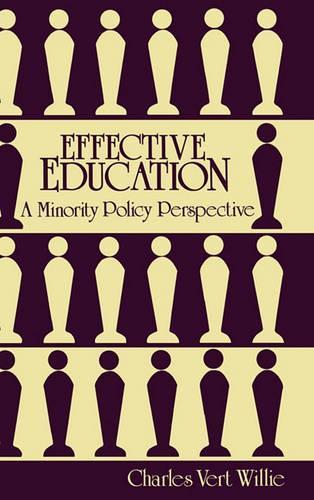
Effective Education: A Minority Policy Perspective
(Hardback)
Publishing Details
Effective Education: A Minority Policy Perspective
By (Author) Charles V. Willie
Bloomsbury Publishing PLC
Praeger Publishers Inc
11th February 1987
United States
Classifications
Tertiary Education
Non Fiction
370.973
Physical Properties
Hardback
156
Width 152mm, Height 229mm
397g
Description
Effective Education analyzes the ways in which majority and minority interests interact in the educational system. It outlines the concepts, goals, and policies of effective educational environments, and examines teaching and learning strategies for diversified groups of students. Despite the additional challenges presented by diversified student populations, author Charles Vert Willie demonstrates the advantages which may also derive from these groups, and shows how minority students can make general contributions to educational reform.
Reviews
A collection of loosely connected, laconic, sometimes nostalgic personal reflections on minority education. Willie has drawn a significant amount of this book from his previous publications. Part 1 includes three chapters related to concepts, goals, and policies. A chapter on education and public policy is well conceptualized and presents a strong argument for inclusiveness over exclusiveness.' Chapter 5, in Part 2, summarizes the results of an empirical study concluding that there is an association among race, gender, and socioeconomic status and subsequent life chances. Useful labor statistics are presented and analyzed. Part 3 describes two minority-leadership development programs, the education of liberation leaders Moses, Gandhi, and Martin Luther King, Jr., a brief history of Morehouse College, and harvard's diverse and high-quality student body. The description of effective and ineffective teaching in the fourth section is interesting.... The book's most valuable chapter is on how mentoring can enhance the opportunities of black students and faculties on campuses. Recommended for undergraduate and graduate students.-Choice
"A collection of loosely connected, laconic, sometimes nostalgic personal reflections on minority education. Willie has drawn a significant amount of this book from his previous publications. Part 1 includes three chapters related to concepts, goals, and policies. A chapter on education and public policy is well conceptualized and presents a strong argument for inclusiveness over exclusiveness.' Chapter 5, in Part 2, summarizes the results of an empirical study concluding that there is an association among race, gender, and socioeconomic status and subsequent life chances. Useful labor statistics are presented and analyzed. Part 3 describes two minority-leadership development programs, the education of liberation leaders Moses, Gandhi, and Martin Luther King, Jr., a brief history of Morehouse College, and harvard's diverse and high-quality student body. The description of effective and ineffective teaching in the fourth section is interesting.... The book's most valuable chapter is on how mentoring can enhance the opportunities of black students and faculties on campuses. Recommended for undergraduate and graduate students."-Choice
Author Bio
CHARLES VERT WILLIE is Professor of Education and Urban Studies in the Graduate School of Education at Harvard University.
